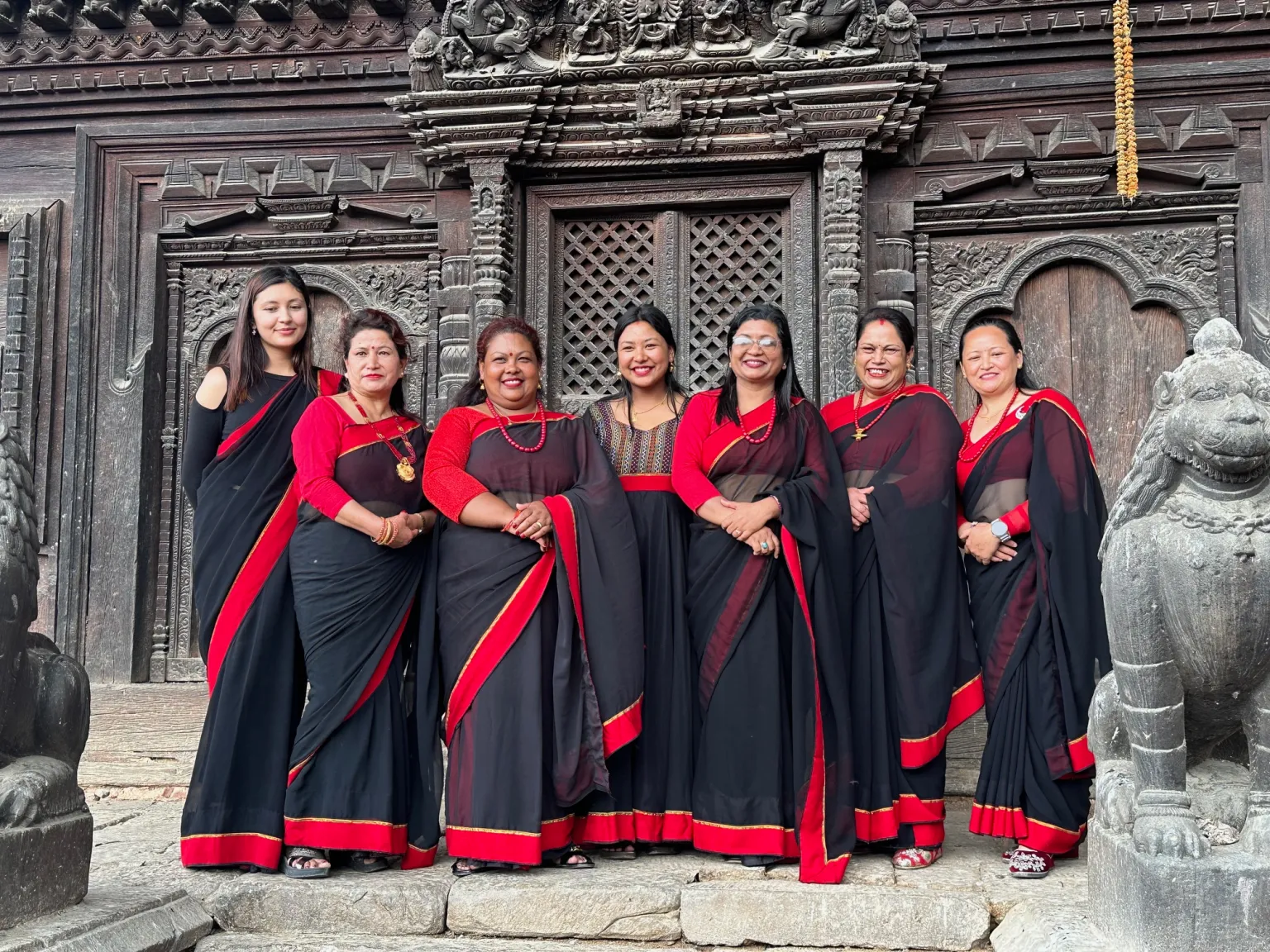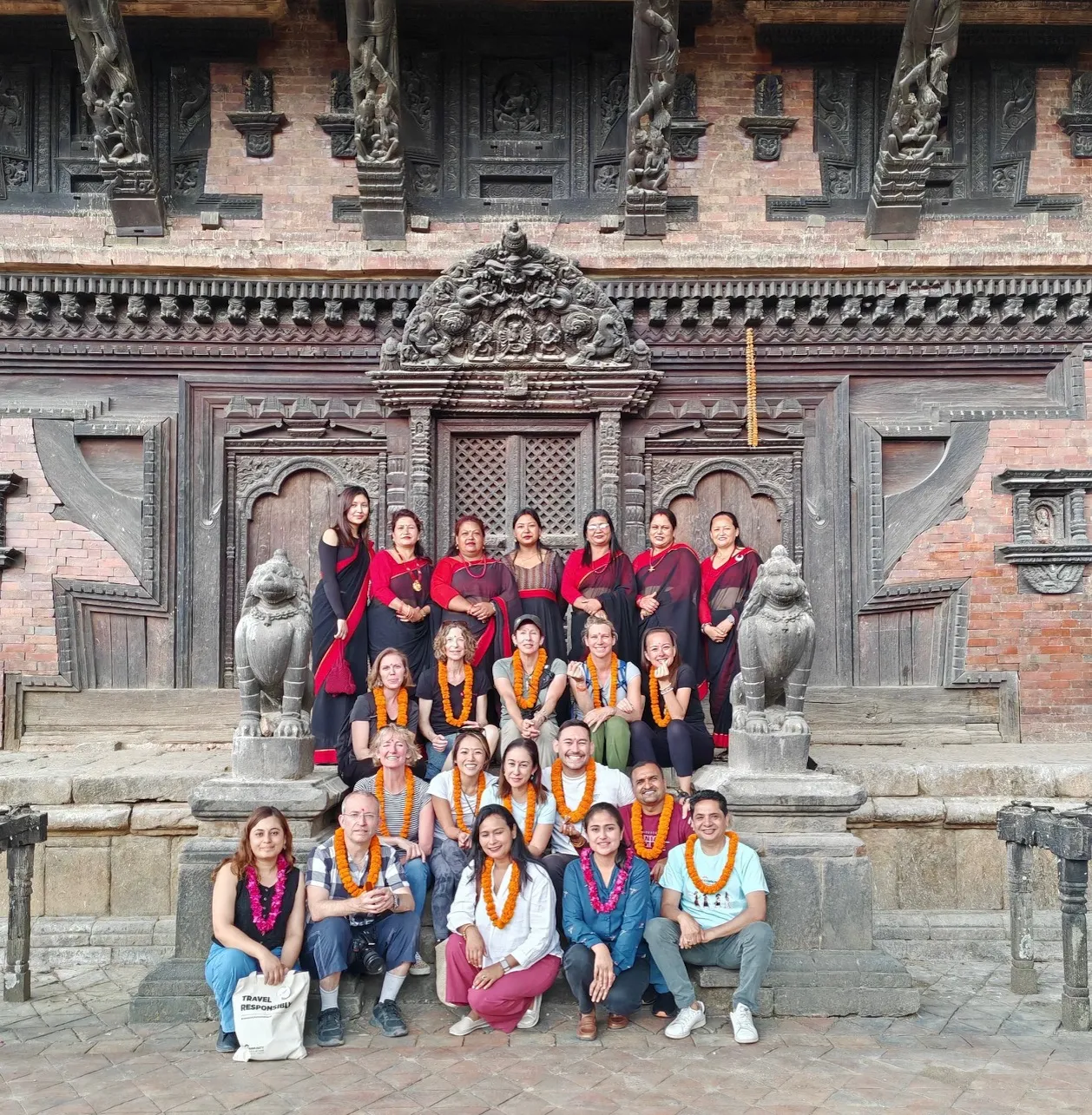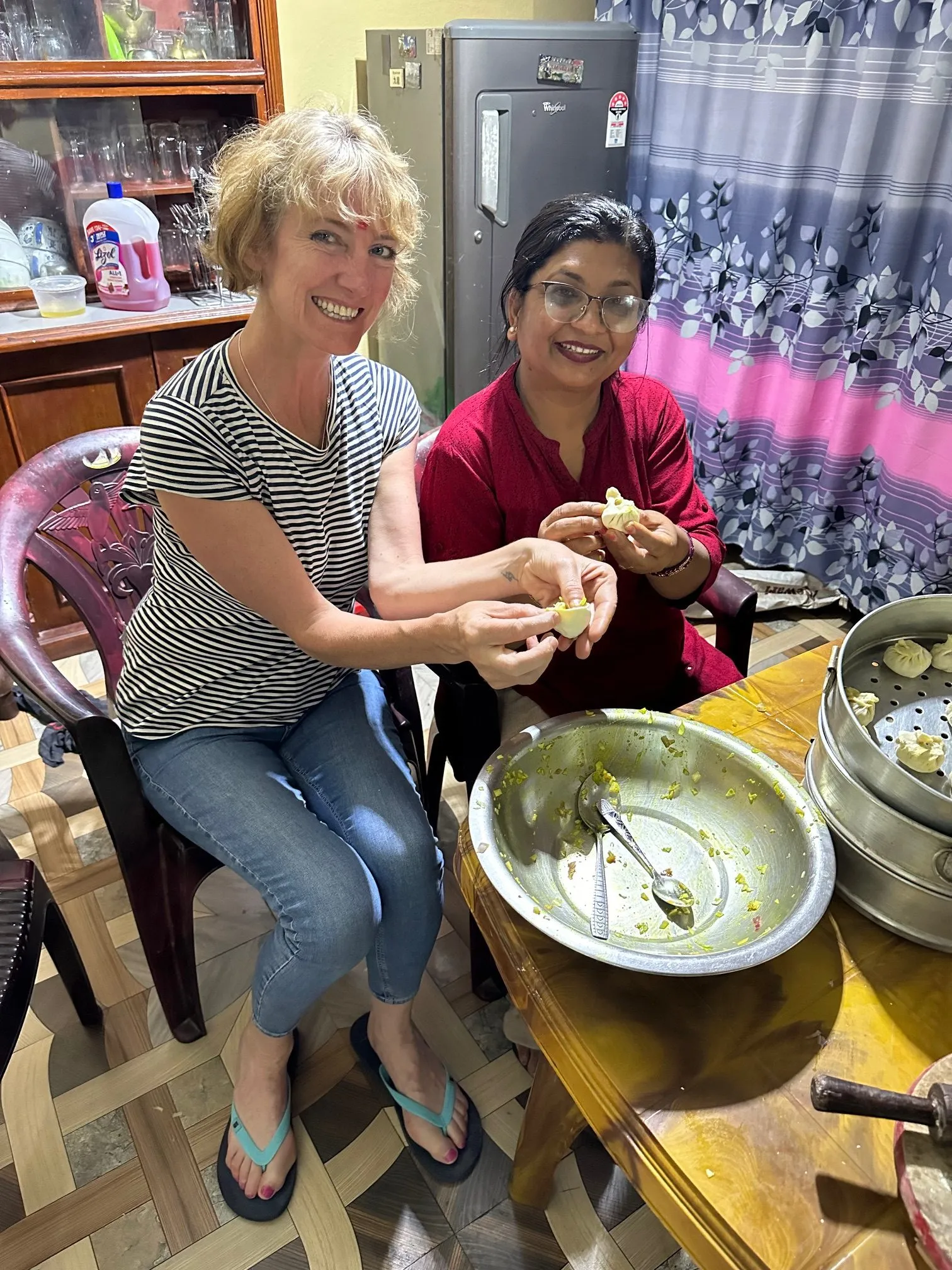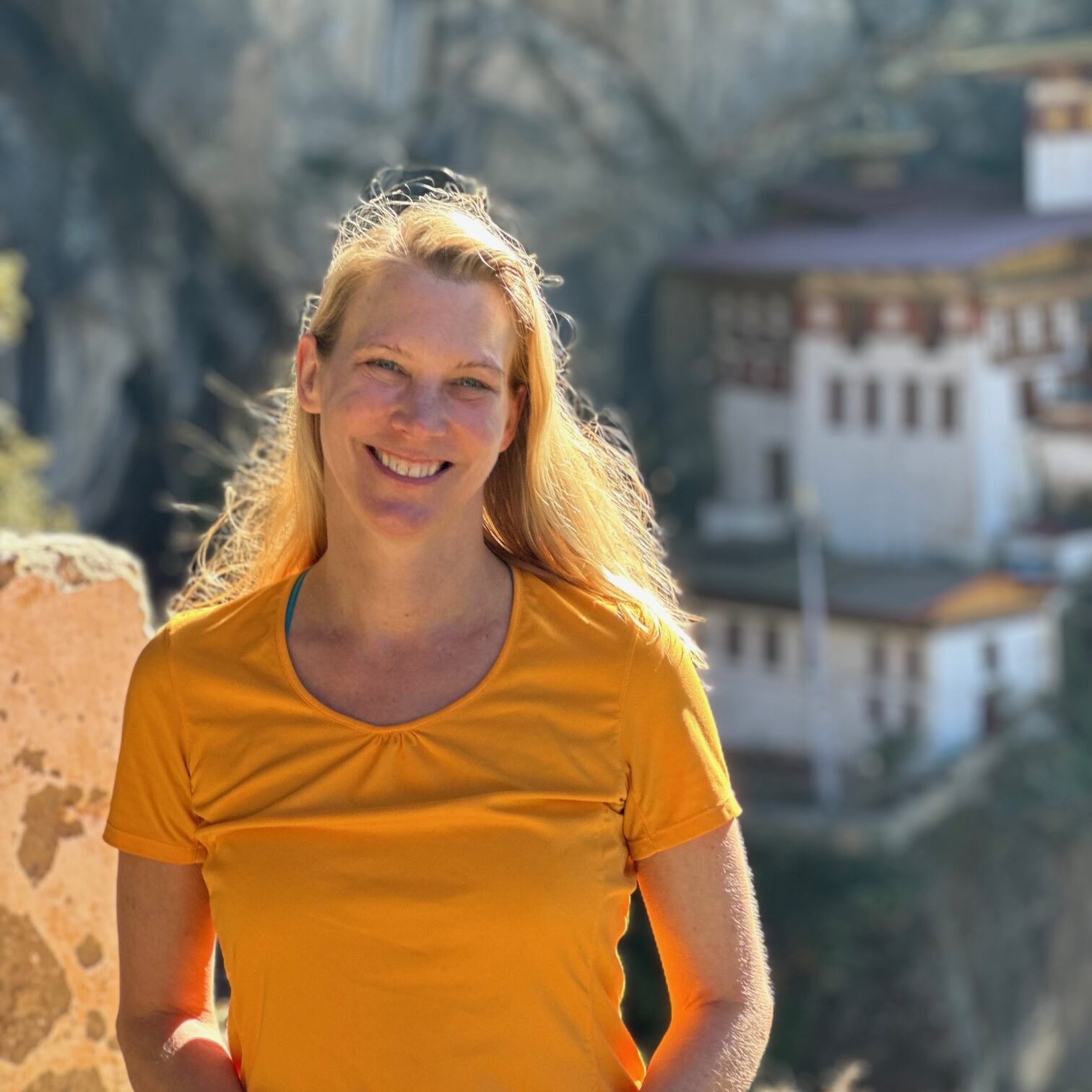Written by Nicole Melancon
In the hills of Kathmandu Valley lies the ancient village of Panauti, renowned for its culture, traditions, and well-preserved Newari architecture. At the heart of the community is the Panauti Community Homestay, a women-led initiative that started in 2012 and today has spread to 36 communities throughout Nepal, creating hope, inspiration, and opportunity for rural communities worldwide. Meet the women behind the movement.

This past May, as part of the Community Homestay Network’s #CommunityConnect, I traveled to Nepal to experience community tourism firsthand. As part of the Community Homestay Network program in Panauti, I stayed with Shila Amatya and her family in her home where I learned the inspiring story of how Shila became the first woman to open her home to travelers in 2012 sparking a movement that has empowered women and changed lives across Nepal. Today, she is the President of Panauti Community Homestay, one of the most successful homestays in Nepal.
The Pioneer
Shila was born in the Terai Lowlands of south-central Nepal near Chitwan National Park where she met her husband Ashok Amatya, who was working as a tour guide. Over a home-cooked dinner of Dal bhat (Nepalese lentil curry and rice), Shila sat down with us at her kitchen table to tell us the story.
“It was a love marriage,” confided Shila with a smile, “which was unusual at the time, and a little difficult because we are from different castes. I am Chhetri and Ashok is Newar. However, we made it work and after our marriage, we moved 200 km away to Panauti as it is the tradition in Nepal for the bride to move to her husband’s hometown”.
Ashok began working as a guide in 2002 with Royal Mountain Travel taking him frequently to the Himalayas for long trekking trips. Like most Nepalese women, Shila spent her days rising before dawn to clean the home, prepare meals, and care for her young daughter while her husband was away.
It was through his work as a guide at Royal Mountain Travel that Ashok met Shiva Dhakal (the founder), and they quickly became friends. During a visit to Panauti to attend a family festival with Ashok, Shiva experienced Panauti differently by being part of the community’s celebration.
While he had visited Panauti several times before, this time he realized what a beautiful, meaningful experience it was and how much Panauti has to offer travelers. Panauti is close to the capital city, filled with history, beauty, and culture. Yet few tourists have experienced Panauti or more so, real Nepali life.
Shiva had come from a large, close-knit family in rural Nepal and understood the power of family, tradition and community empowerment. He also believed strongly in the socio-economic importance of community tourism as a way to showcase the culture and beauty of lesser-known rural destinations in Nepal and use travel as a force for good.

After decades of working in the tourism industry with Royal Mountain Travel, he witnessed the profound ability of community tourism to uplift lives. Shiva vividly recalls a moment that deeply influenced his journey—listening to Bruce Poon Tip, founder of G Adventures and the Planeterra Foundation, passionately speak about the power of community tourism. Bruce’s vision of how tourism can directly benefit local communities and genuinely transform lives resonated with Shiva in a profound way. It sparked a realization of how he could bring this vision to life in Nepal. With that inspiration, Shiva came up with an idea that would empower communities in a meaningful way.
Shiva recommended to Ashok that he and Shila receive some of their Royal Mountain Travel trekking guests at their home, in one of their spare rooms to share their culture and experience life with a local Nepali family. They began taking in guests and it was a win-win situation. Travelers loved the meaningful, authentic experience and Shila earned additional income to support the home.
“Tourists loved Panauti. They would come for a visit but after sightseeing they went somewhere else for food and lodging. We understood that we had a lot to offer them so decided to open up our homes” Shila told me.
Slowly, Shila and Ashok convinced other women to open their homes to travelers. It wasn’t easy in the beginning as the concept of homestays was new. Furthermore, there was a lot of doubt in the community that a women-led business could succeed. However, women began to see the positive impact it was making on Shila’s life, and they were more willing to give it a try. “At the time there was no opportunity for many women in our village except working inside the home, cooking, cleaning and taking care of children. Women like me, wanted to earn money, improve our lives and status in society. So we began forming our grassroots homestay initiative”.
Over time, the concept stuck and the movement grew. Travelers loved the experience of seeing the untapped beauty and diversity of Nepal, and the women involved in the homestay earned additional income and were empowered.
In 2012, ten women from the community joined forces to run the Panauti Community Homestay, and in 2017 after positive feedback from both the community homestay women and the guests, Shiva launched Community Homestay Network (CHN).
CHN is a social enterprise that supports a network of community homestays throughout Nepal. CHN connects travelers with communities across Nepal, providing a unique opportunity to stay with Nepali families and immerse in real Nepali life. At the same time, local host families get the opportunity to share their culture and landscapes with travelers while gaining access to a sustainable source of income through tourism.
The authentic experiences CHN offers travelers are created to have a positive impact on Nepali communities, women, and families, as well as on the travelers themselves. Best of all, all the homestays and experiences are created by the community. They are community-driven and community-led, by women.
Today, there are 362 households in 36 communities impacting the lives of over 1748 people, and it all started with Shila’s home.
“All over Nepal there are 36 homestays and I started this” Shila told us proudly during the second night at her home. “Slowly it expanded all over Nepal. I’m so happy, I thank God I have this opportunity, for me and my family.”

After tea, we moved into the family room, and Shila’s 20-year-old daughter, Amy, joined the conversation. As Amy artfully applied earth-toned henna on me and Sara’s arms, Shila continued her story. “Slowly over time, the movement grew. My friends wanted to join because they saw what I was doing and were inspired. In 2015 we developed other community offerings for our guests such as a community hike and then the Panauti Bike station for our cycling tours. We employ almost 50 people in the community and the network has grown to 15 houses.”
Even Shila’s daughter Amy is involved and has worked with the tightly-knit group of homestay mamas for the past four years. While she just received her degree in Information Technology, Amy supports the Panauti CHN as often as she can by giving community tours. Shila is now the President of Panauti Community Homestay, and as the pioneer of one of the most successful, women-led community homestays in Nepal, she and her team have trained other women in and outside of her community sharing entrepreneurial skills and how to run a successful homestay.
“There have been many ups and downs along the way,” Shila says. “The pandemic and the earthquake were difficult times when we had to close our homestay program. We also had to build trust within our community that a women-led business would succeed. That was hard too but we never gave up and always persevered. Today we have a voice in our community, respect and also support from our local government. I feel so proud”.
During our stay in Panauti, we did many activities designed by the Panauti Community Homestay mamas with preserving their unique culture and heritage in mind. We had a traditional purse-making class where we learned the techniques used by the women’s grandmothers. We also participated in a cooking class hosted by our CHN mamas in their kitchen where we prepared momos (a traditional Nepali steam-filled dumpling).
We ended our visit with a large Newari feast featuring over 15 traditional Newari foods accompanied by dancing performed by two young girls in the community. “By doing these programs, we ensure our culture and traditions are not lost,” Shila told us. “The two young girls dancing during the feast learned this style of dance thanks to our scholarship funds from the CHN program.
Of the 80% of the income received through our homestay program (20% goes to CHN to cover training and other administrative fees), 20% of that pool goes into a fund that is reinvested back into community initiatives.
The fund is used for English and cooking lessons for the mamas, and for other training to help preserve culture and teach women how to run a hospitality business.

The impact
The Community Homestay program has been life-changing for Shila and the other Community Homestay mamas. The socio-economic empowerment of the program has been incredible for everyone involved.
“In Nepal women are always on the backside, meaning working inside the house and taking care of children, cleaning and cooking, and only the husband makes money,” Shila told us. “With the Community Homestay Network, women can earn income for the first time. We can spend money on our children’s health and education. We no longer have to ask our husband’s permission to buy something. We even have our own bank accounts. It has been incredibly empowering.”
The program has also given women a voice in their community along with leadership and entrepreneurial skills. Moreover, it has lifted women’s status and respect in a patriarchal society.
“In our society, women are not always respected but now I am, ” Shila confided to Sara and I. “People in the community now know who I am. While the project is small, I am very proud. I have big things in my life now, the local government is supporting me too”.
Another benefit of the program is it promotes sustainable tourism by bringing travelers to lesser-known destinations, easing the tourism strain on the environment and showcasing cultures and traditions that are unique to each community. As more and more youth leave the villages for work and education in Kathmandu or abroad, traditional life, culture, and heritage are being lost. “Nepal has over 142 ethnic groups and castes all with their own culture, language, dress, food, and traditions” Shila informed us. “Each one is different and must be preserved, which we are trying to do”. Community Homestay Network mamas design programs to promote and safeguard these traditional arts, cooking, dance, music, and more.
The impact for the guests
As Shila intricately wrapped me inside a stunning, elaborate saree, preparing me for our last night, the grand finale, an impressive hour-long Newari feast, and dance, my eyes began to fill with tears. The past two days with Shila, her family, and the warm, welcoming mamas of the Panauti Community Homestay were magnificent. Any doubts I had about returning to Nepal and wondering if I could ever be as special to me as it was before, dissipated into the back of my mind.
As Shila braided my hair into a lachha (a Newari hairpiece decoration) all I could do was smile at her with a deep, loving sense of gratitude. The past two days were such a beautiful, unforgettable experience where I truly was able to connect with Nepali culture and life. But what I enjoyed the most, was the connection that me and Shila had made. In only two short days, I no longer felt like a guest but like part of her family, living side by side in her home. What an incredible gift.
If you go:
Check out all the amazing experiences and available homestays at www.CommunityHomestayNetwork.com. CHN runs homestays in 36 different communities throughout Nepal, with several that are conveniently located in Kathmandu Valley and easily accessible from Kathmandu. Trips can be booked directly or as part of a G Adventures Nepal trip.
About the author:
Nicole is a freelance travel writer, content creator, and digital strategist with a passion for sustainable travel and storytelling that began after a life-changing trip to Nepal in 2010. The plight of the people she met compelled her to join a growing movement of dedicated journalists, content creators, and humanitarians striving to raise awareness, funds, and impact change fueled by the collective power of our online presence and voice. For the past 14 years, Nicole has worked with various nonprofits and social impact organizations sharing their stories on her blog which focuses on sustainable, adventure travel and social good. She recently dove into freelance journalism and has been published in National Geographic, BBC, Toronto Star, and more. She also works as the Content Editor for GLP Films, an award-winning full-service content marketing agency dedicated to sustainable tourism.



Post a comment